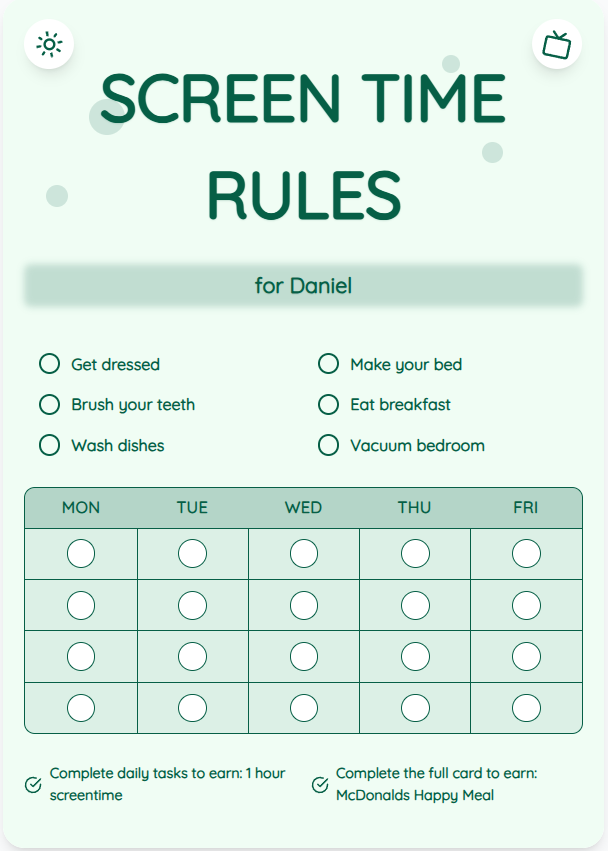Understanding the Effects of Screen Time on Your Child's Brain
As a parent, you may have concerns about the impact of screen time on your child's brain development. In this comprehensive guide, we delve into the effects of excessive screen time and provide actionable advice to help you navigate this digital age with confidence.
See What Your Screen Time Chart Will Look Like
Here's an example of a beautiful, customizable screen time rules chart you can create for your family

The Science Behind Screen Time Effects
Research shows that excessive screen time can have various effects on a child's brain, including decreased gray matter volume, impaired cognitive function, and disrupted sleep patterns. Excessive screen time has been linked to attention issues, increased impulsivity, and even potential long-term effects on brain development.
Practical Tips for Managing Screen Time
To promote healthy brain development, it's essential to set limits on screen time. Create a screen time chart using tools like ScreenTimeRules.com to establish boundaries. Encourage outdoor play, reading, and creative activities as alternatives to screen time. Be a role model by limiting your own screen time and engaging in quality family time without devices.
Put These Tips Into Action
Create a custom chart to implement these strategies with your child
Balancing Screen Time with Educational Content
Not all screen time is created equal. Choose educational apps, games, and shows that offer value and engage your child's mind. Use screen time as a tool for learning and exploration rather than passive entertainment. Monitor your child's screen time usage and prioritize quality over quantity.
Practical Tips for Success
- Create a daily screen time schedule for your child.
- Encourage physical activity and social interactions offline.
- Set designated screen-free zones in your home.
- Discuss screen time rules openly with your child.
Frequently Asked Questions
How much screen time is too much for children?
The American Academy of Pediatrics recommends limiting screen time to 1-2 hours per day for children aged 2-5, with consistent limits for older children. However, individual needs may vary, so it's essential to observe your child's behavior and adjust screen time accordingly.
Can screen time have positive effects on brain development?
While excessive screen time can have negative impacts, educational content and interactive experiences can stimulate cognitive skills and creativity. The key is to strike a balance and ensure that screen time enhances rather than hinders your child's development.
By understanding the effects of screen time on brain development and implementing practical solutions, you can create a healthy digital environment for your child. Visit ScreenTimeRules.com to create personalized screen time charts and take control of your family's screen time habits today.
Ready to Transform Your Family's Screen Time?
Join thousands of parents who have successfully managed screen time with our customizable charts.
